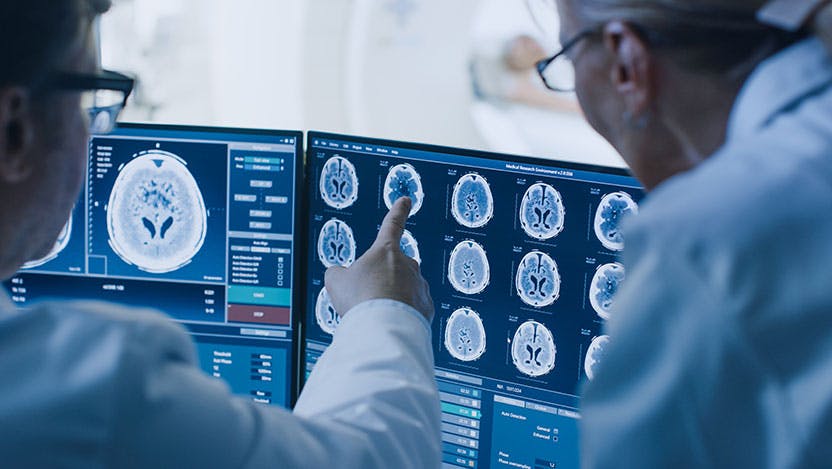Telestroke protocols streamline life-saving care for stroke patients

When someone has a stroke, prompt diagnosis and treatment can mean the difference between recovery and lifelong disability.
The University of Chicago Medicine Telestroke Network enables onsite and remote stroke experts to work collaboratively in real time to diagnose and treat stroke patients as quickly as possible to reduce stroke-related disabilities.
The UChicago Medicine Telestroke Network takes advantage of the joint expertise in stroke care across UChicago Medicine, including in Hyde Park and at UChicago Medicine Ingalls Memorial Hospital in Harvey.
“The fundamental rule of stroke care is ‘time is brain,’” said Saif Nazir, MD,* Chair of Emergency Medicine at UChicago Medicine Ingalls Memorial. “Now, lifesaving diagnostic and treatment options can be expedited via remote telecommunications with our colleagues in Hyde Park during the initial triage stage in the Emergency Department. This upfront communication supports timely treatment and transport, if necessary, to improve outcomes for patients.”
UChicago Medicine is recognized as a Comprehensive Stroke Center by the Joint Commission on Accreditation of Healthcare Organizations – the highest level of certification for hospitals that meet standards to treat the most complex strokes. The stroke center also received the 2021 Get with the Guidelines Stroke Gold Plus with Honor Roll Elite designation from the American Heart Association and American Stroke Association.
UChicago Medicine Ingalls Memorial is recognized as a Primary Stroke Center for demonstrating a disciplined management system, combined with utilizing the best clinical practices to deliver immediate and effective care to patients experiencing a stroke. The accreditation was awarded by DNV GL, a world-leading certification body that provides quality-driven accreditation and clinical excellence certifications to hospitals.
The telestroke network assembles a multidisciplinary clinical team — emergency medicine physicians, nurses and EMS staff, neurosurgeons, vascular neurologists, radiologists and the radiology team, laboratory professionals, information technology experts, and other practitioners, along with air and ground transporters — to work together so that no time is wasted.
“We confer with our colleagues to diagnose, administer clot-dissolving drugs and intravascular procedures to provide the highest levels of care as quickly as possible, whether that is delivered here or in Hyde Park,” Nazir said.
Planning for the telestroke network began early in the pandemic, and the program launched in April 2021. The telestroke network uses a high-tech communications platform to expedite advanced levels of care to improve patient outcomes. As soon as a potential stroke patient is transported to the hospital, a Code 66 is activated. This triggers the stroke team to prepare radiology for an immediate CT scan upon the patient’s arrival in the ED. At the same time, the neurologist (on call 24/7) joins the team via mobile high-resolution video to evaluate the patient, view images of the CT scan and make decisions on an appropriate care plan.
This upgrade streamlines the coordinated decision-making process, while seamlessly blending system-wide expertise to deliver advanced levels of care in a time-sensitive framework for patients in the Southland.
UChicago Medicine neurologist Scott Mendelson, MD, PhD, Chief Quality Officer for the Department of Neurology, gave an example of this coordination in action: “As a result of the team effort, a patient was diagnosed with an intracerebral hemorrhage and we were able to complete initial care at Ingalls Memorial, including transfer and evaluation at UChicago Medicine in less than 120 minutes,” he said. This includes “door-in-to-door-out” at Ingalls Memorial of 55 minutes and transportation via helicopter to neurocritical care in Hyde Park.
In addition to his clinical work, Mendelson’s research focuses on developing strategies to reduce delays in emergency room care and interhospital transfers of stroke patients.
“Since seconds count in stroke care, telestroke readiness enables us to provide a time-sensitive collaborative delivery of advanced care from the moment an incoming patient presents in our ED,” said Chris Fishback, RN, nursing director of Ingalls Memorial’s ED. “Integrating advanced expertise, eliminating treatment delays and providing prompt care protocols are instrumental in continuously improving stroke patient outcomes.”
“The selfless dedication of all team members to implement this life-enhancing upgrade is to be applauded,” said Shyam Prabhakaran, MD, MS, Chair of the Department of Neurology at UChicago Medicine. He is an internationally recognized leader in stroke research and treatment who has been instrumental in reorganizing ambulance transports for stroke patients in Chicago.
The telestroke upgrade is in sync with data-based evidence that prompt diagnosis and appropriate treatment increases the chances that clot-dissolving therapies (thrombolytics) will be effective when intravenously delivered within four and a half hours after a patient experiences symptoms, said James Brorson, MD, medical director of UChicago Medicine’s Comprehensive Stroke Center.
“This is an outstanding example of how integration is key to achieving our One UChicago Medicine mission,” said Randy Neiswonger, chief operating officer, Community Health and Hospitals Division, and vice president for operations, Ingalls Memorial. “Our focus will continue to be on sharing best practices while implementing consistent processes and procedures to advance UChicago Medicine’s quality of care for our Southland patients.”
*Dr. Saif Nazir is an independent medical practitioner and is not an employee or agent of Ingalls Memorial Hospital or the University of Chicago Medical Center (“UChicago Medicine”).
Stroke Center
The University of Chicago Medicine is a Joint Commission Certified Comprehensive Stroke Center, nationally recognized for its expertise in providing the highest level of care for stroke patients.
Learn more about our stroke and neurovascular services